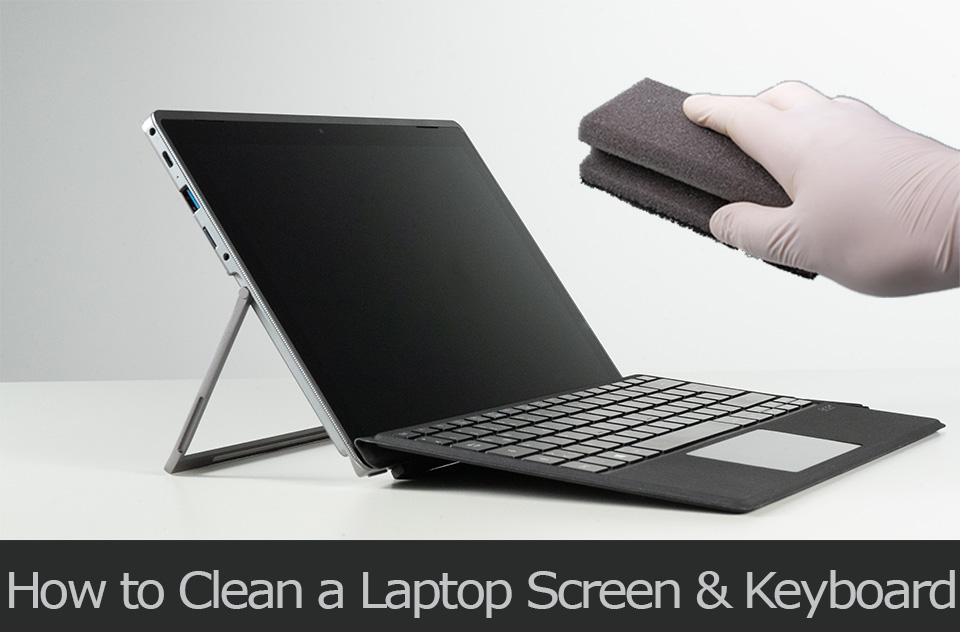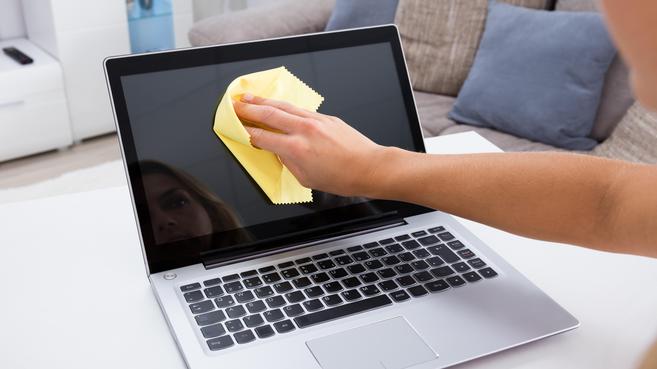
Here's Exactly How To Clean Your Laptop Screen And Keyboard, According To The Pros
You and your laptop have been though a lot together. Besides the usual typing and clicking, your computer has stuck by your side through countless cups of coffee, lunches, and snacks. Then, there are those almost-spills and pet hair incidents, or maybe even a few close calls with little ones running around (hey, it happens).
And, if you work in an office, there are coworkers touching your screen to point things out, nearby coughs and sneezes, handshakes before typing up emails... you get the picture. Basically, your computer is around dirt and germs—yours and others'—all day long.
Laptops "get thrown in bags, they travel, they find themselves under your couch," says Gary Power, co-founder and director of client services at Power Consulting Group, an IT consulting firm based in NYC. All that adds up to grimy screens, dirt-filled keyboards, and ports clogged with dust. So, it's important to have a quick and easy cleaning routine at the ready.
Still wondering if your computer is *really* gross enough to need a deep clean? Even if it looks like new, your tech can harbor viruses, bacteria, molds, and even fungi, one study in the Journal of Medical Science and Clinical Research found. But researchers confirmed that just one cleaning can remove over 95 percent of germs and bacteria from a laptop's surfaces, so there's never been a better time to set aside a few minutes for a spring sprucing.
And, if you use any additional accessories (like a Bluetooth keyboard or mouse), it's a good idea to give those a quick scrub, too, Power says. He adds cleaning isn't just great for your peace of mind—it can also extend the life of your tech, too.
This content is imported from {embed-name}. You may be able to find the same content in another format, or you may be able to find more information, at their web site.So, what's the best way to make sure your laptop is germ-free? Ahead, learn how to clean your laptop screen and keyboard, according to the pros:
1. Turn off your computer.
Before you grab any supplies, make sure all of your tech is completely turned off (not just in sleep mode). "Remove the charger as well so that way there's no potential that there could be surges to it," explains Joe Silverman, founder of New York Computer Help.
After you turn it off, your laptop is still warm. So, wait three to five minutes before you start to clean, advises Silverman: "You don't want that heat to cause any issues when you're using some water on it." Once your computer has had a short rest, you're ready to go.
2. Wipe down the screen.
WHOOSH! Electronic WipesWHOOSHamazon.com$14.99$11.99 (20% off)SHOP NOWFirst up: the screen. A microfiber rag with water will do the trick—or, pick up some electronic wipes. Power recommends the brand WHOOSH! because "it's one of the best screen cleaning and laptop cleaning devices out there." Go over the screen once or twice gently with your wipe or rag and make sure not to press too hard, Silverman adds.

3. Avoid too much moisture.
Don't apply the water or cleaning solution directly to your computer. As for your microfiber towel, just use a tiny amount of liquid. "Worst case, you use too much liquid, and that could get within the laptop and cause motherboard issues and power issues," Silverman explains. A good rule of thumb is to make sure the rag is damp, but not soaked through or dripping.
4. Same goes for harsh chemicals.
Bleach and ammonia shouldn't go anywhere near your tech, says Power. Most regular household cleaning supplies are too powerful for the thin metal, according to Silverman.
Related Story7 Things You Should Clean Every Single DayThey can cause your laptop to shut down altogether or, in some cases, oxidize the outside coating and remove the color. "The same goes for the screen, especially Macbook screens," Silverman adds. "That could really take the oxidation out of the screen," or remove the shininess and make it look dull. Windex works for a stand-alone monitor, but stick with water or a tech wipe for your actual laptop, says Power.
5. Get any dirt and debris out of your keyboard.
Falcon Dust, Off Compressed GasFalconamazon.com$7.97SHOP NOWNext up is your keyboard. Step one is to use a can of compressed air "because all those crumbs and meals and snacks usually fall in between the keys," says Silverman. Food particles under your keys can actually cause mold to grow, he adds, and canned air is one of the best ways to clean out those hard-to-reach places. After that, use your microfiber rag or tech wipe to go over your keys and pick up any dust that might be left over.
Note: Don't pop keys off of your keyboard to clean under them. Both Silverman and Power note that newer laptops have keys that are much harder to reattach, so it's a bad idea to mess with them.
6. Clean out all of the ports on each side.
That can of air will also work wonders cleaning out those ports on either side of your laptop, Power says. "Nowadays, most laptops come with a USB-C port, which is super safe," he clarifies. But if you have an older laptop with a traditional USB-A port, "you got to be careful because that's alive," meaning the tech inside is more sensitive.
So, what's the difference? A USB-A port is bigger, and fits most flash drives and traditional USB cords (it's probably the one you're thinking of already). USB-C ports are shorter and thinner. They're also symmetrical—so if your cord or flash drive work no matter which way you plug it in, it's a USB-C. Otherwise, it's a USB-A.
7. Steer clear of trackpads and speakers.
Don't clean your trackpad (that's the mouse attached to your laptop) or any speakers. "I've seen customers clean up their trackpads, and then their trackpads don't work," Silverman says. Stay away from any vents or fans, too. If you think they need a reset, it's best to take your computer to a professional.
Besides your computer, here are four more household items you should clean regularly:
8. Repeat monthly.
"Once a month, go through [this] checklist," Power recommends. A monthly cleaning will keep build up from forming and can help extend the life of your computer. Power's suggestion? Make your laptop lathering sessions a regular event on your calendar, so you never forget.
9. FYI: Touch screens may need to be cleaned more often.
Related StoryHow To Clean Your Phone's Screen The Right WayIf you use a laptop or tablet with a touch screen, you might want to wipe that down even more often, says Power. "Humans generally tend to touch the same areas," he explains, and the resulting build up can lead to static electricity that can harm your screen. So, consider giving those screens an extra scrub in between computer cleanings for the best results.
10. Know when to bring in the professionals.
Sometimes, your computer might be too dirty to clean yourself—or, it might be dangerous for you to clean out the places that really need a refresh. If you spill a drink like water or coffee on your laptop, Power says it's best to bring it to a professional.
In the future, Silverman suggests keeping all food and drink at least an arm's length away from your tech to prevent accidents. That way, there's enough time to snatch your laptop away (or maybe grab a paper towel). And, who knows? Power says you could even save hundreds of dollars in tech-saving services.
This content is created and maintained by a third party, and imported onto this page to help users provide their email addresses. You may be able to find more information about this and similar content at piano.io}})